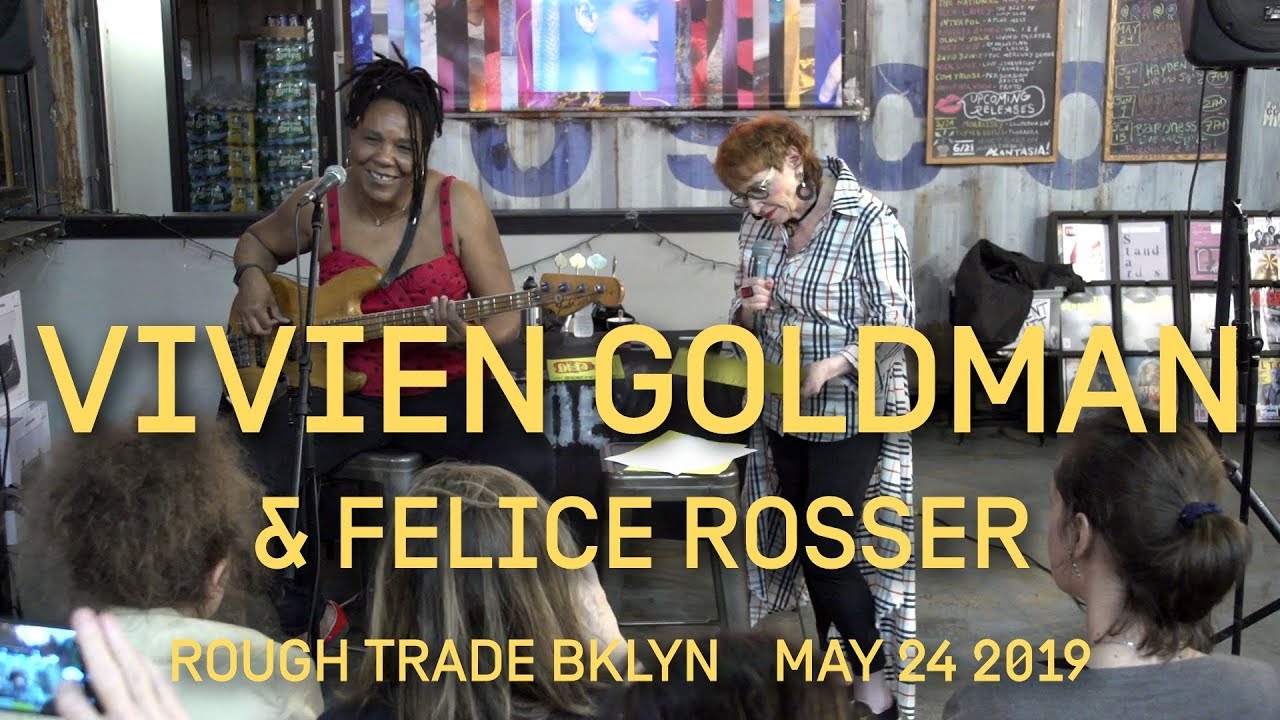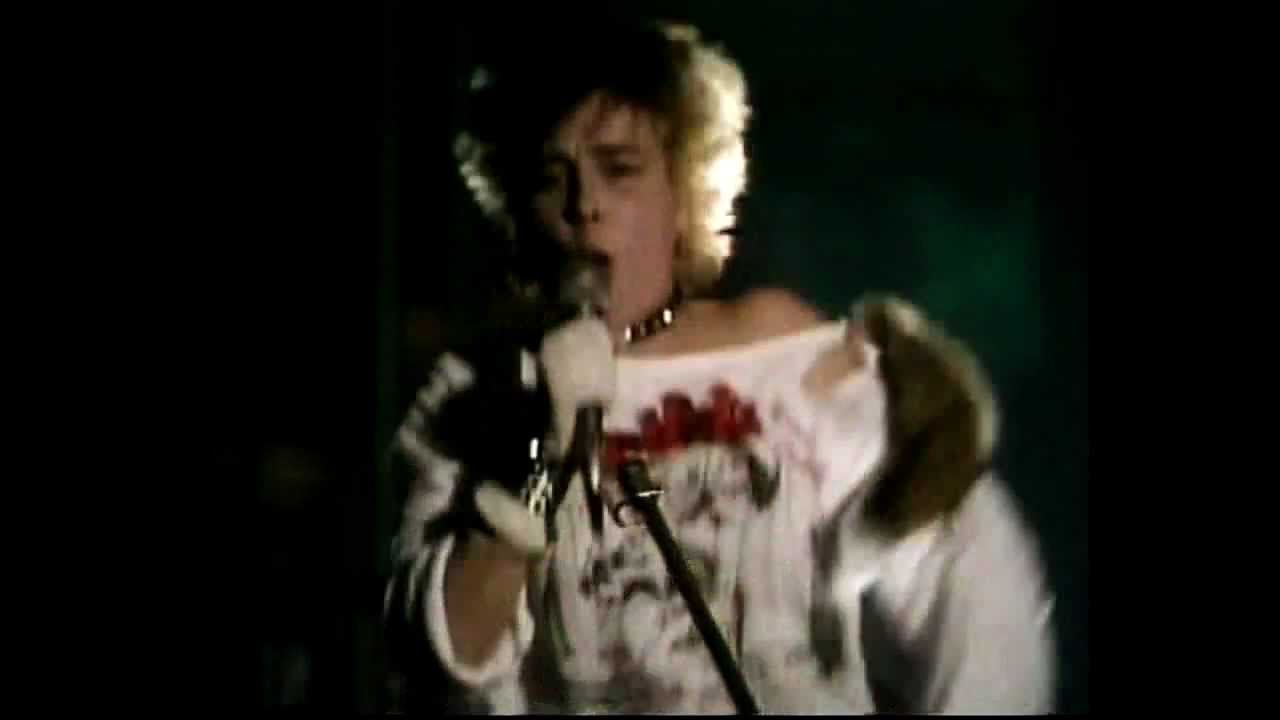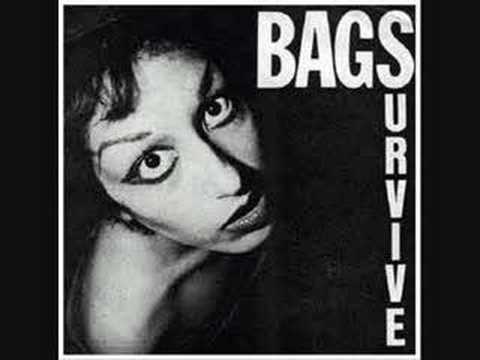At Rough Trade’s New York City store on a Friday evening in late May, the longtime British music journalist Vivien Goldman was launching her newly-published book, Revenge of the She-Punks: A Feminist Music History From Poly Styrene to Pussy Riot. But it wasn’t your average reading/Q&A session.
Accompanied by bassist Felice Rosser of the band Faith, Goldman also sang songs in front of a predominantly female audience. Goldman has lived two lives. Not only is she a writer, but was also briefly a post-punk recording artist during the late ’70s and early ’80s, both as a solo artist and with the Flying Lizards, New Age Steppers, and others. In her airy voice, she performed the dub-sounding ‘Launderette’, her debut 7” from 1981, an unsentimental and anti-romantic commentary on relationships between men and women produced with John Lydon and Keith Levene. “You wanted coffee round at my place / It all seemed just a lark / But you hadn’t left there two weeks later / and your hair’s all over the bath…”
At a time when women’s rights are being outright attacked here in the States, both Goldman’s book and the Rough Trade event took on a timely significance. As the author later says, a month after her book launch: “[Punk’s] central tenets of expressing discontent with the system – we need it now more than ever, don’t we?”
More than 40 years after the punk explosion in Britain, the former Londoner who now lives and teaches in New York City still carries the torch for the genre’s ideals. Since her days writing for the British music magazine Sounds in the mid 1970s, Goldman has covered the punk scene and its pioneering female acts such as the Slits, the Raincoats, and Patti Smith. Now it all comes full circle with Revenge of the She Punks, which was recently published in the UK on Omnibus Press. Drawing from Goldman’s previous writings and new interviews, Revenge of the She-Punks not only references well-known acts like Bikini Kill, Sleater-Kinney, the Pretenders, and Blondie, but it also mentions equally-important contributions by artists from countries such as Japan, China, Jamaica, Colombia, India, and France.
The idea for Revenge of the She-Punksdates back to Goldman’s written contribution to Pitchfork’s 2016 feature ‘The Story of Feminist Punk in 33 Songs’. It prompted the interest of Gianna Lamorte, an assistant director at the University of Texas Press, who later contacted Goldman to write a book. “I hadn’t really been thinking of doing that,” the author admits. “But when the opportunity arose, I realized that there was stuff I wanted to say. It’s funny because writers had been finding quotes from my old articles, and it was sending my head spinning that these debates were still going on and even intensified. I decided to write something, hoping to energize people and encourage women (but it can be men, too).”
Unlike other previous works about punk music, Revenge of the She-Punks is unique in that it doesn’t follow a chronological order. Rather, it is divided into four main themes: identity, money, love, and protest. “It seemed the best way to convey the information,” Goldman explains about that approach. “I just sat down and thought, ‘What binds these women together? What are our concerns then and now?’ I listened to a lot of the music, and I distilled it down into themes [that] seemed to me sensible.”
Each biographical passage about a different artist seamlessly segues into the next, regardless of the time period or country of origin. Despite the artists’ diverse backgrounds and circumstances, a common pattern emerges: these were women musicians who challenged and fought the male status quo both within the music industry and society. “It took a long time to get the voices of the women,” says Goldman. “I was curious to see how it would turn out. I imagined that there was this glorious cacophony of different opinions and slightly different takes, and yet some unifying themes. That is really how it proved to be.”
Poignant and sometimes tragic stories emerge from the book, especially in cases where female voices were silenced. For example, the career of Spain’s Las Vulpes abruptly ended in the early 1980s after a TV performance of their controversial single, ‘Me Gusta Ser Una Zorra’ (‘I Like Being a Bitch’), that led to protests and the cancellation of their tour. And only a few years ago Pragaash, a trio of teenagers from Kashmir, disbanded after a Muslim cleric issued a fatwa. “The group that never was,” Goldman says about Pragaash. “Women assert their voices in punk music, which is the easiest and most accessible way of making music if you haven’t had much experience. It is a threat to certain regimes.”
Other comments from some of the artists in the book are quite revealing in that they don’t quite conform to traditional feminist views. One of the surprising revelations came from China’s Gia Wang of Hang on the Box (known for the song ‘Asshole, I’m Not Your Baby’) who said that she is both pro-Trump and anti-abortion. And Lesley Woods, formerly of the Au Pairs who is now an immigration lawyer, said that if she was in a band now, she would focus her attention more towards immigration and child trafficking since gender issues have improved.
“The Riot Grrls had some different concerns,” Goldman adds. “It was so much about hidden abuse, domestic abuse, even from within the family. There was a lot of that going on in that milieu. The other interesting thing that came up was how, in some places, it’s more about the broader struggle, the men and women thing is just irrelevant… especially in Russia. [Pussy Riot member] Nastya Mineralova was almost quite dismissive of all conventional feminism.”
No history about women in punk would be complete without the mention of the British pioneers from the ‘70s: The Slits, The Raincoats, and the late Poly Styrene of X-Ray Spex, all of whom started without any role models. They in turn inspired Goldman to pursue her own inner punk in her later music career. “[Poly] was an absolute leading light and genius of the scene,” says Goldman. “She was very sweet to me, very warm. She had her own torments that are well documented, very sensitive and unbelievably clever and creative. Her significance is boundless.
“When you have a group like the Slits, the Raincoats, the Mo-dettes, the Delta 5 – this was literally unprecedented. At the time, when the pioneers began, there was an empowered feeling in the air. Even amidst all the much-vaunted chaos at the time, legislation was being passed. For the first time women who had been beaten up by their husbands had a legal recourse. And this was the first time that a woman could sign to buy a property [without her father or husband].”
Goldman says she feels vindicated after writing the book in that punk is still an ongoing creative engine for change, especially for women. “We can’t forget the fact that there are still big changes needed to come before women have control in the music industry,” says Goldman, “even though we have Beyonce and Taylor Swift. When I was first writing I used to say, ‘If we got a chance to hear the music that women might make, what would it sound like?’ So [punk] was an experimental era, which provided some answers. There was such a breadth of music.”
Outside of writing, Goldman has returned to performing and making music after a long hiatus; she recently completed her first collection of new recordings produced by Killing Joke’s Youth. Since writing about a growing number of female musical acts for Sounds over 40 years ago, Goldman has not wavered in her belief that punk is a liberating force for women. “People are trying to diminish the idea of punk in a way because things happened, like the commodification of punk style in the malls: ‘it’s over, it was just a few months, it only happened in a certain place.’ Hopefully this book will [dismiss] all that, because it shows you how the ideas have taken wings and been an inspiration – and continue to be an inspiration.”
Revenge of the She-Punks: A Feminist Music History From Poly Styrene to Pussy Riot, by Vivien Goldman, is published by Omnibus Press







